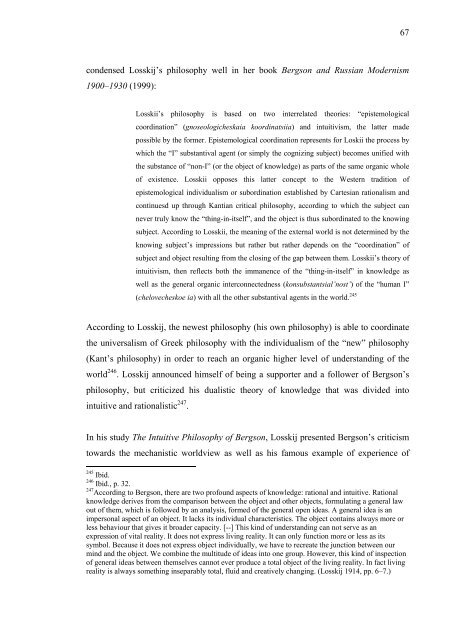Boris Asaf'ev and the Soviet Musicology - E-thesis
Boris Asaf'ev and the Soviet Musicology - E-thesis
Boris Asaf'ev and the Soviet Musicology - E-thesis
You also want an ePaper? Increase the reach of your titles
YUMPU automatically turns print PDFs into web optimized ePapers that Google loves.
condensed Losskij’s philosophy well in her book Bergson <strong>and</strong> Russian Modernism<br />
1900–1930 (1999):<br />
Losskii’s philosophy is based on two interrelated <strong>the</strong>ories: “epistemological<br />
coordination” (gnoseologicheskaia koordinatsiia) <strong>and</strong> intuitivism, <strong>the</strong> latter made<br />
possible by <strong>the</strong> former. Epistemological coordination represents for Loskii <strong>the</strong> process by<br />
which <strong>the</strong> “I” substantival agent (or simply <strong>the</strong> cognizing subject) becomes unified with<br />
<strong>the</strong> substance of “non-I” (or <strong>the</strong> object of knowledge) as parts of <strong>the</strong> same organic whole<br />
of existence. Losskii opposes this latter concept to <strong>the</strong> Western tradition of<br />
epistemological individualism or subordination established by Cartesian rationalism <strong>and</strong><br />
continuesd up through Kantian critical philosophy, according to which <strong>the</strong> subject can<br />
never truly know <strong>the</strong> “thing-in-itself”, <strong>and</strong> <strong>the</strong> object is thus subordinated to <strong>the</strong> knowing<br />
subject. According to Losskii, <strong>the</strong> meaning of <strong>the</strong> external world is not determined by <strong>the</strong><br />
knowing subject’s impressions but ra<strong>the</strong>r but ra<strong>the</strong>r depends on <strong>the</strong> “coordination” of<br />
subject <strong>and</strong> object resulting from <strong>the</strong> closing of <strong>the</strong> gap between <strong>the</strong>m. Losskii’s <strong>the</strong>ory of<br />
intuitivism, <strong>the</strong>n reflects both <strong>the</strong> immanence of <strong>the</strong> “thing-in-itself” in knowledge as<br />
well as <strong>the</strong> general organic interconnectedness (konsubstantsial’nost’) of <strong>the</strong> “human I”<br />
(chelovecheskoe ia) with all <strong>the</strong> o<strong>the</strong>r substantival agents in <strong>the</strong> world. 245<br />
According to Losskij, <strong>the</strong> newest philosophy (his own philosophy) is able to coordinate<br />
<strong>the</strong> universalism of Greek philosophy with <strong>the</strong> individualism of <strong>the</strong> “new” philosophy<br />
(Kant’s philosophy) in order to reach an organic higher level of underst<strong>and</strong>ing of <strong>the</strong><br />
world 246 . Losskij announced himself of being a supporter <strong>and</strong> a follower of Bergson’s<br />
philosophy, but criticized his dualistic <strong>the</strong>ory of knowledge that was divided into<br />
intuitive <strong>and</strong> rationalistic 247 .<br />
In his study The Intuitive Philosophy of Bergson, Losskij presented Bergson’s criticism<br />
towards <strong>the</strong> mechanistic worldview as well as his famous example of experience of<br />
245 Ibid.<br />
246 Ibid., p. 32.<br />
247 According to Bergson, <strong>the</strong>re are two profound aspects of knowledge: rational <strong>and</strong> intuitive. Rational<br />
knowledge derives from <strong>the</strong> comparison between <strong>the</strong> object <strong>and</strong> o<strong>the</strong>r objects, formulating a general law<br />
out of <strong>the</strong>m, which is followed by an analysis, formed of <strong>the</strong> general open ideas. A general idea is an<br />
impersonal aspect of an object. It lacks its individual characteristics. The object contains always more or<br />
less behaviour that gives it broader capacity. [--] This kind of underst<strong>and</strong>ing can not serve as an<br />
expression of vital reality. It does not express living reality. It can only function more or less as its<br />
symbol. Because it does not express object individually, we have to recreate <strong>the</strong> junction between our<br />
mind <strong>and</strong> <strong>the</strong> object. We combine <strong>the</strong> multitude of ideas into one group. However, this kind of inspection<br />
of general ideas between <strong>the</strong>mselves cannot ever produce a total object of <strong>the</strong> living reality. In fact living<br />
reality is always something inseparably total, fluid <strong>and</strong> creatively changing. (Losskij 1914, pp. 6–7.)<br />
67

















